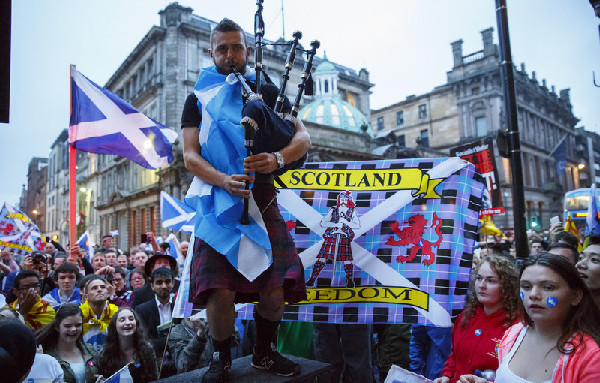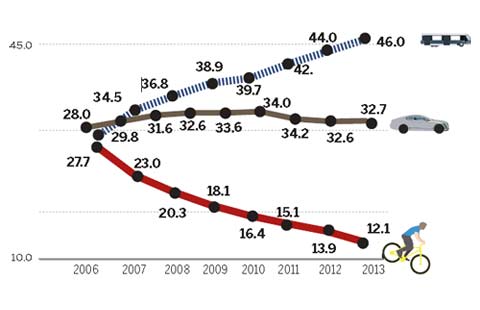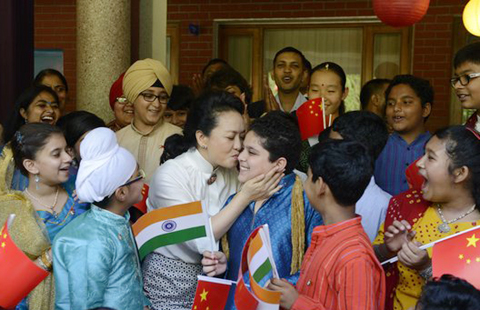Scots vote in record numbers, await independence verdict
Updated: 2014-09-19 10:06
(Agencies)
|
|||||||||||
 |
|
Scottish independence campaigners pose against a Unionist group after debating at George Square in Glasgow whilst people of Scotland going to polling stations to vote on the Scottish independence referendum on Sept 18, 2014. [Photo/IC] |
SCOTLAND'S FATE
They were asked to answer "Yes" or "No" to the question: "Should Scotland be an independent country?".
Electoral officials said the result will be announced around sunrise on Friday when all regional votes have been submitted. But partial results will give a strong indication after the count of cities such as Glasgow are declared around 0400 GMT.
Indications were that a record number of Scots, above 80 percent, had cast a vote.
"There might be some issues with the weather but I'm still saying about breakfast time," Chief Counting Officer Mary Pitcaithly said.
With more than 486,000 voters, Scotland's largest city of Glasgow is crucial and is due to report around 0400 GMT. Edinburgh and Aberdeen, which with Glasgow make up nearly a quarter of the electorate, are also expected around that time.
Other key regions to watch are North and South Lanarkshire and Aberdeenshire, where Alex Salmond, the 59-year-old nationalist leader, cast his vote on Thursday.
Uniting to counter what was viewed as the biggest internal threat to the United Kingdom since Ireland broke away nearly a century ago, the British elite sought to convince Scots to back the union by promising more powers.
British leaders accept that even if Scotland votes to keep the union, the United Kingdom's structure will have to change, as granting further powers to Scotland has provoked calls for a less centralised state from lawmakers in England.
Prime Minister David Cameron's job could be on the line if Scotland breaks away, but the 47-year-old prime minister has been largely absent from the campaign, leaving former Prime Minister Gordon Brown to lead the unionist battle cry.
Queen Elizabeth, who faces a possible division in her kingdom not seen since the days of her namesake Elizabeth I at the start of the 17th century, was at Balmoral, a granite palace in Scotland where she spends her summers.
Elizabeth, who under her constitutional role must stay politically neutral, told a well-wisher last Sunday that she hoped Scots would consider their choice carefully.
If Scots vote for independence, 18 months of negotiations would follow on how to carve up everything from North Sea oil and European Union membership to Britain's main nuclear submarine base, which is based on the Clyde.
The prospect of breaking up the world's sixth-largest economy and a permanent member of the United Nations Security Council, has stoked concern in the United States and Europe.
The United States has made clear it wants the United Kingdom, it main ally in Europe, to remain together.
Related Stories
Scotland: Yes or no? 2014-09-19 07:24
10 cultural facts about Scotland 2014-09-18 12:59
'Yes' in Scotland could mean 'maybe' for Chinese companies 2014-09-18 08:34
Scotland: An inconvenient possibility 2014-09-18 07:51
Scotland highly split ahead of vote on independence 2014-09-18 06:56
Scottish FM insists using pound if Scotland votes for independence 2014-09-17 11:49
Today's Top News
US pledges diplomatic resolution of Ukraine crisis
Alibaba set to soar at $68 per share
Model filial son kept double life a secret
Parents of dead couple granted embryos
Thinnest-condom claims lead to lawsuit
US pledges diplomatic resolution of Ukraine crisis
Cooperation helps extradite fugitives
Xi, Modi set friendly tone for visit
Hot Topics
Lunar probe , China growth forecasts, Emission rules get tougher, China seen through 'colored lens', International board,
Editor's Picks

|

|

|

|

|

|





